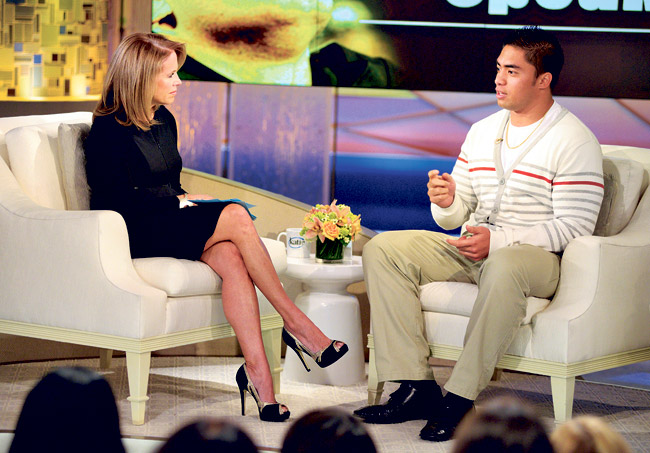Te’o’s Handlers Failed Their Client

Manti Te’o, dressed to show calm in light colors and a non-threatening sweater, chats with Katie Couric | AP photo
Whether Manti Te’o was the innocent, yet naive victim of an elaborate hoax or had purposely taken advantage of the situation for his own benefit is now irrelevant.
Chapter two in the life of Hawaii’s most-decorated collegiate athlete is set to begin, and regardless of impressions, has done nothing to warrant any further embarrassment. And he should be embarrassed.
For the record, and for the final time, here’s what I believe:
Te’o was scammed into believing Lennay Kekua was not only a caring, spiritual, hot Southern Californian girl with enough dreams to fill a phone book, but a real person.
Somewhere along the line, Te’o discovered the hoax and, in an effort to avoid embarrassment and to maintain, or even promote, an image no one could sustain, he perpetuated the lie in a series of bungled public relations moves that only made the matter worse. Most of that is not his fault. Though it doesn’t dissolve him of any responsibility.
Te’o’s biggest victimizers weren’t the mysterious Ronaiah Tuiasosopo and his assorted clan of conspirators, but those who were paid to represent Te’o’s best interests.
According to USA Today, the family hired Hiltzik Strategies, a New York communications firm that has helped big named clients such as Alec Baldwin, Glenn Beck and Milwaukee Brewers outfielder Ryan Braun recover from public relations disasters. Their job with Te’o was the same: Limit the damage and control the message. On the second point they performed quite well. On the first, not so much.
Every moment after Deadspin broke the story, everything Te’o said or did was carefully orchestrated. For the record, the “they” is Hiltzik, Te’o’s agent Tom Condon and Notre Dame University.
Te’o wasn’t like their other clients. Actors, political pundits and professional athletes can benefit from a bit of scandal. It makes them edgy, more interesting. Young people whose reputations are turned into punchlines need to be handled with greater care.
Had Te’o simply admitted he continued the story in a terrible attempt to cover up what he felt was an embarrassing situation, and had apologized, the story would have died immediately.
How could anyone not feel sympathy for a 21-year-old who got scammed and was trying to protect himself from becoming tabloid fodder? Instead, his handlers mandated an unrecorded and unfilmed interview in the presence of representation that immediately made it appeared their client had something to hide.
If that wasn’t enough, they crafted a story that made Te’o sound anything but sympathetic and even a bit dense. Why didn’t he visit the love of his life while she lay in the hospital, busted up after a terrible car crash? “It was a conversation that I didn’t want to have with my parents,” Te’o told Katie Couric in front of a roomful of pantsuit-clad middle-aged women, who are naturally disposed to be more sympathetic than their male counterparts, “to say, ‘Mom and Dad, I missed my flight, I’m not going to come on my flight because I am going to go to see Lennay in hospital.'”
Either this woman didn’t mean very much to Te’o or he is one cold individual. Either way, it didn’t speak well for his character.
Is it possible that Te’o flubbed this part of the carefully prepared interview? Perhaps. But he proved deft in his ability to redirect, deflect or reverse some of the trickier questions. That takes skill.
These techniques are standard message-control devices image consultants use to make their clients more sympathetic. Lance Armstrong used this quite well during his interview with Oprah Winfrey.
When Winfrey asked Armstrong why he waited so long to admit his use of performance-enhancing drugs, Armstrong answered with a question, and then diverted the question to another area without answering. Classic redirection.
Te’o was nearly as good. “Didn’t you say things that weren’t true and isn’t that, in essence, lying?” asked Couric. “The biggest lie I am sorry for was the lie I told my dad,” said Te’o.
Nice use of deflection. “Didn’t you have something to gain by keeping this story alive?” queried Couric. “The only thing I basked in is that I had an impact on people. That people turned to me for inspiration,” said Te’o, channeling Armstrong by focusing on his charitable work and sound character image to alter the message.
“You stuck to the script and you knew something was amiss, why?” asked Couric. “Katie, put yourself in my situation.” Yes! Turn the question back on the questioner!
When I interviewed Te’o as a high school senior, I witnessed a polite, intelligent, well-spoken individual. His handlers turned him into the opposite. smurray@midweek.com Twitter @SteveMurray84





